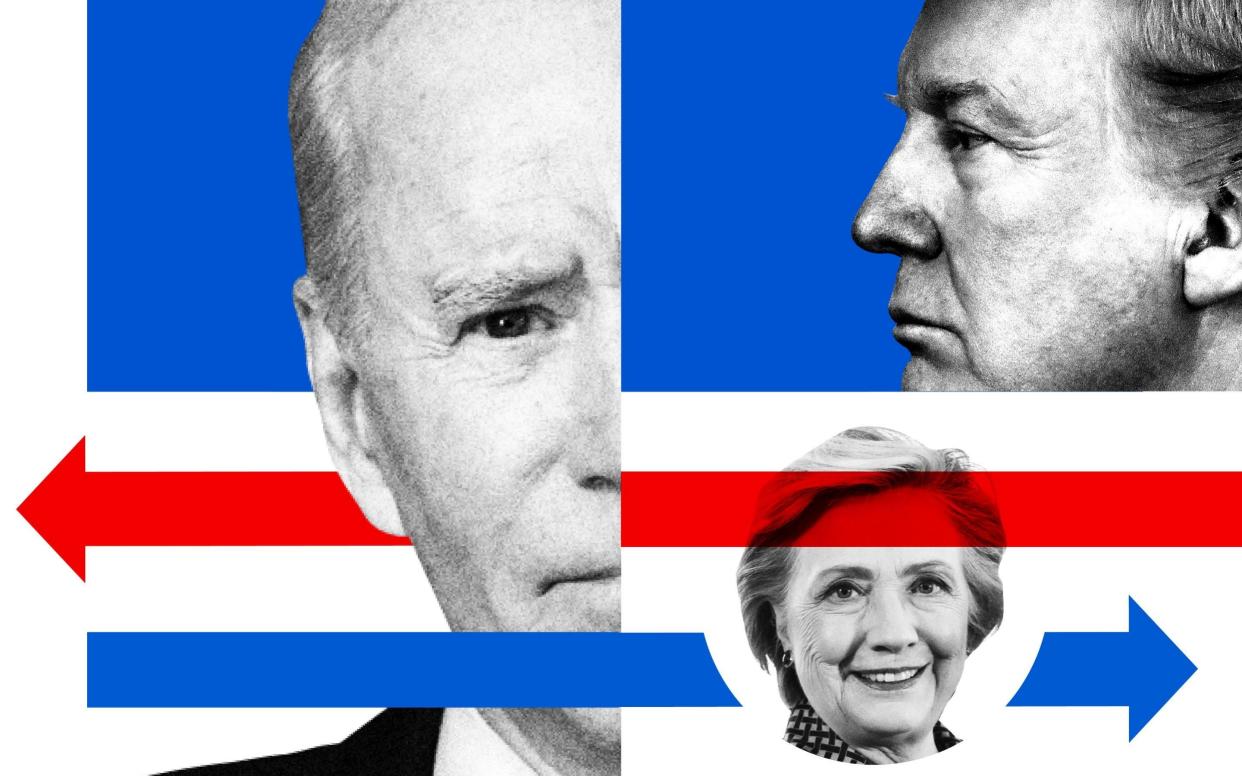Joe Biden vs Hillary Clinton: How the polls compare in the week before the US election

- Oops!Something went wrong.Please try again later.
- Oops!Something went wrong.Please try again later.
Not once in the 100 days leading up to the 2016 election did Hillary Clinton's polling average fall behind Donald Trump's.
Her worst moments of the campaign, such as a pneumonia diagnosis, hacked emails and even further FBI investigation, all failed to put Trump in the lead at any point.
Yet come election night in November, Clinton's lead vanished. As the ballots were counted across the US, her margin shrank further.
It was not enough to deny Clinton victory in the popular vote - but it did lose her key swing states needed to win the White House like Pennsylvania and Florida.
Many Joe Biden supporters are wary of counting on his polling lead for these reasons.
But with election day less than a week away, Biden's position is much stronger than Clinton's. That lead comes as a result of two key advantages over his predecessor: he is actually liked by Americans, and has a far larger and resilient lead over Trump.
Winning hearts and minds
Favourability data shows Trump has been one of the most unpopular candidates of recent times. At the beginning of 2016, while Trump was still competing with the likes of Ted Cruz and Marco Rubio for the Republican nomination, more than 60 per cent of Americans thought of Trump negatively.
This decreased to around 55 per cent by election day that year, but unpopularity followed Trump into the White House. Only one other president has run again with as little popularity: Gerald Ford, who lost to Jimmy Carter in 1976.
But, back in 2016, most Americans did not like Clinton either - just under 55 per cent rated her unfavourably in the week before the US voted, on November 8.
This is the first key strength Biden holds over not just Trump, but Clinton - he is more liked than disliked. The most recent data suggests around 52 per cent of Americans think of Biden favourably, a figure that has been rising since the 2020 campaign took off in the summer.
His appeal has earned him the support of far more key groups than Clinton did in 2016, boasting, for instance, more than double the margins among women. It is also helping him make inroads with a part of the American electorate crucial to Trump's victory in 2016: middle-aged men.
All of this translates into a far healthier national polling lead for Biden than Clinton at this point in the campaign. Biden leads by a margin of 9.5 percentage points over Trump, compared to the 5.3 percentage point lead Clinton held over Trump with less than a week to go.
Not only is Biden's lead higher - it is also proving more resilient as the campaign enters its final stretch. Clinton's lead was beginning to shrink as election day approached, dropping to 4.0 percentage points just before American voted. Biden's, on the other hand, has not seen a similar drop, so far.
Of course this is just national polling, and the nature of the US electoral system means the presidency is fought and won in states, where polling is more inaccurate. But the data suggests Biden lead may still be strong enough.
What if the polls are as wrong as in 2016?
State-level polling predictions in 2016 were notoriously wide of the mark, underestimating the swell of support for Trump and overestimating Clinton's lead.
On average across all states, Clinton's result was 2.6 percentage points out, while Trump's was out by 6.6.
Joe Biden appears to have set himself in a stronger position, even accounting for variances in polling.
His polling margin against Trump leads Clinton's position at the same point in the race four years ago in all but eight states.
In some the margin is considerably higher - in the safe Democratic stronghold of Rhode Island it is 19.1 percentage points higher than Clinton had been polling.
But the election will be won or lost in a handful of key swing states, where it appears Democratic support is recovering after the shock defeat four years ago.
In Wisconsin and Pennsylvania - states which flipped to Trump in 2016 - Biden's polling suggests he has rebuilt former President Barack Obama's lead - at 5.3 and 7.1 respectively.
And while it appears he has not done enough to regain Ohio from the Republicans, Biden could be on course to pick up some surprise wins to take him over the line of the electoral college.
In North Carolina, Georgia and Arizona, states which have returned Republican votes for the last two elections, Biden's polling puts him in the lead, with a steady move toward the Democrats over previous years.
And with polling in Texas seemingly on a knife edge, it could be Biden's election to lose, with the mistakes of the Clinton campaign a distant memory.

